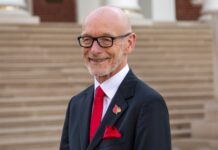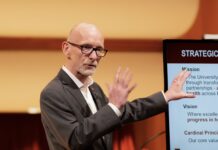My job is weird. I’m in charge of something many people don’t understand or often consider, and yet it’s captured by a term familiar to nearly everyone: sustainability. It’s a notion that’s becoming increasingly widespread, influential and popularized, although even those of us who live and breathe sustainability struggle to capture its essence succinctly.
To explain my passion and profession I use a model I like to call the “three-ring circus” of sustainability. It elegantly expresses the fact that the sustainability tent is a big one, that there are no easy answers and that my job often feels like herding cats.
You see, sustainability isn’t simply about “going green” and becoming better environmental stewards. Nor is it merely a question of efficiency and better management of economic resources. Nor is it solely a matter of social justice and building healthy, resilient communities. The truth is that it’s about all of these things at once and that true sustainability requires us to seek a balance between environmental, economic and social responsibility.
The challenge of sustainability is that it requires society, institutions and, indeed, each and every one of us, to develop the knowledge and skills necessary to make decisions based on these three realms of consideration. It requires flexible, interdisciplinary thinking in a world that tends to reward and encourage narrow, highly-specialized problem-solving. It is as much art as science.
Sustainability is slippery. It is not a static concept. It changes over time and across contexts. Ultimately, sustainability is best thought of not as an achievable end-point, but as a harmonic convergence with which we must strive to stay in tune.
As murky as the concept may be, it’s helpful to realize that sustainability is based on some common principles. Having studied the nature of sustainability in academia and in life, I’ve learned that it is fundamentally about:
• Reducing/Eliminating waste and pollution;
• Reducing/Eliminating abuse (to people, animals, planet);
• Relying on renewable resources;
• Changing the disposable mindset;
• Cultivating diversity (both human and ecological); and
• Building resilient communities.
Figuring out what all of that means can be daunting ─ whether you’re standing in the grocery aisle, deciding where your family is going to live, or crafting a university’s strategic plan. But there is nothing more important for us to consider. Indeed, sustainability matters deeply to all who hold a stake in our collective future.
At the University of Louisville, sustainability matters to students because they will inherit the world we are busy creating today by both design and unintentional consequences. If we ignore sustainability concerns, we could very well bequeath to future generations a chaotic, polluted world and an overwhelming economic, social and environmental debt. If, on the other hand, we use the guiding principles of sustainability to make wise, intentional choices today, we better ensure that future generations inherit a world of sufficient resources and opportunity for all.
Sustainability matters to UofL employees because their health, wellness and financial security are all affected by the way we manage our resources. At UofL, our commitment to sustainability also extends to the types of problems our researchers study and the subjects our faculty teach.
Finally, sustainability matters to the communities in which our students and employees live and work. A positive future can only be built on the three equal pillars of social, economic and environmental stewardship. By staking our institutional future on a careful balancing of these three values, UofL is helping build that positive future and serving as a model for others in our region. Our sustainability efforts show that UofL is investing in tomorrow and that we care deeply about the future of our students, employees and community.

























